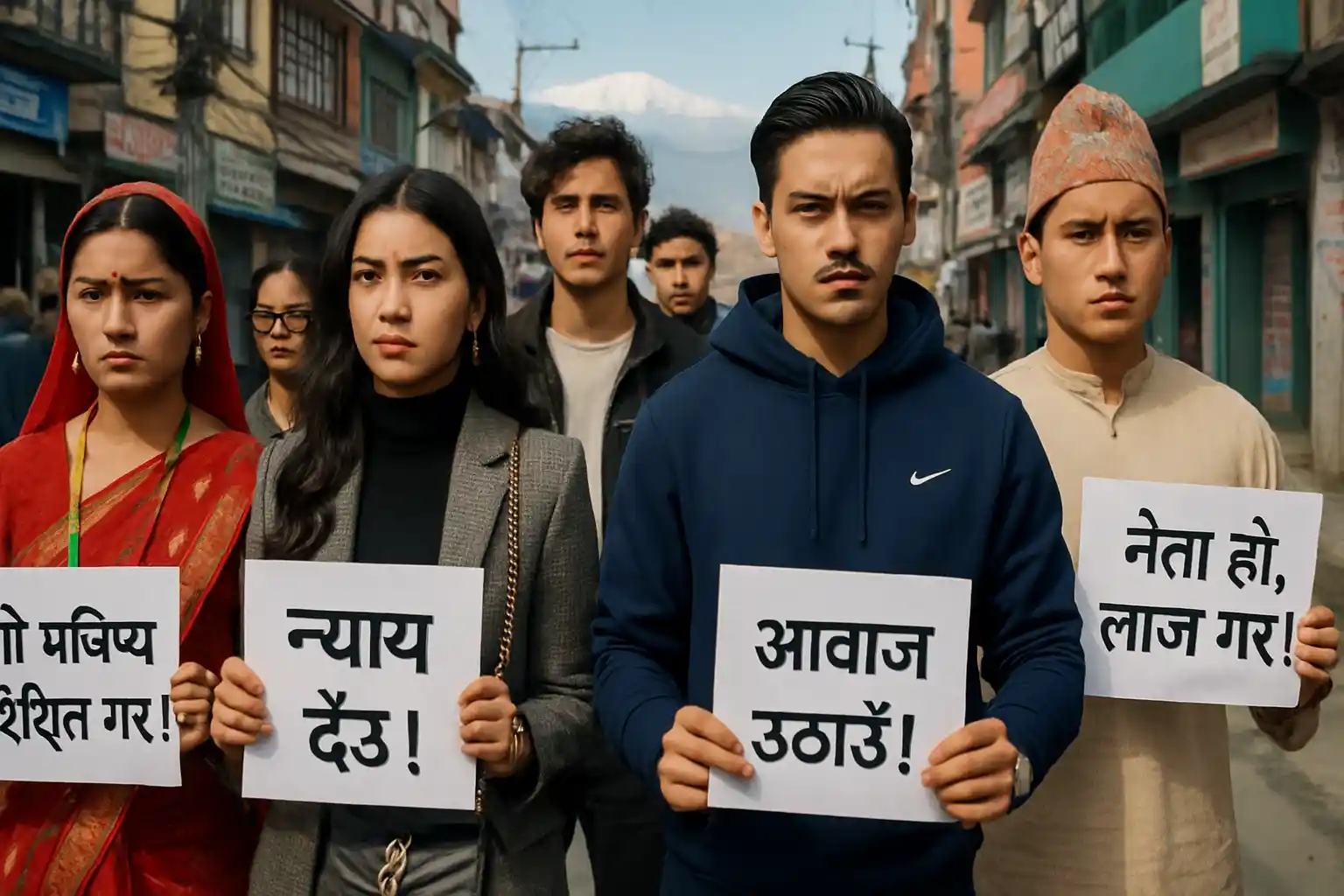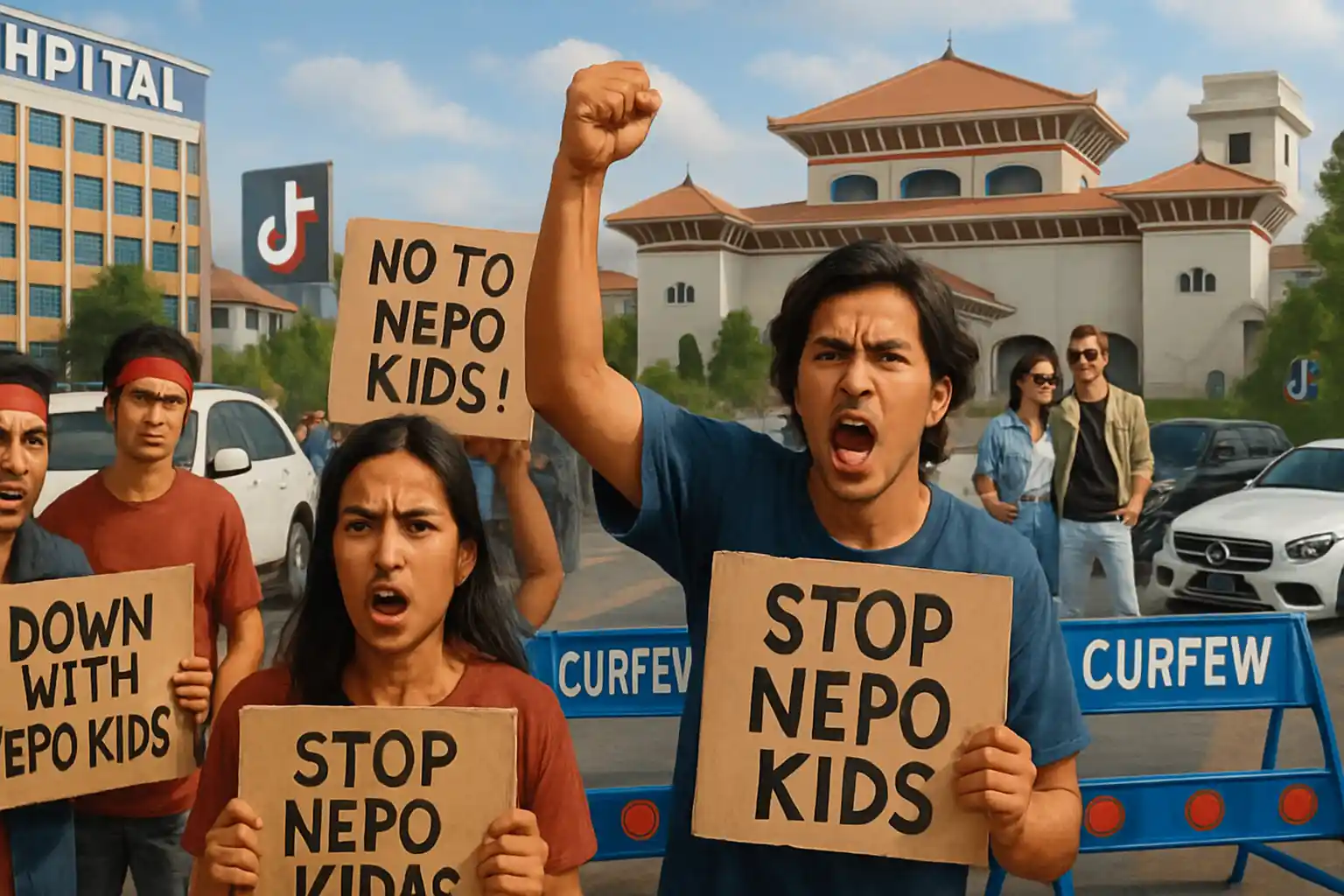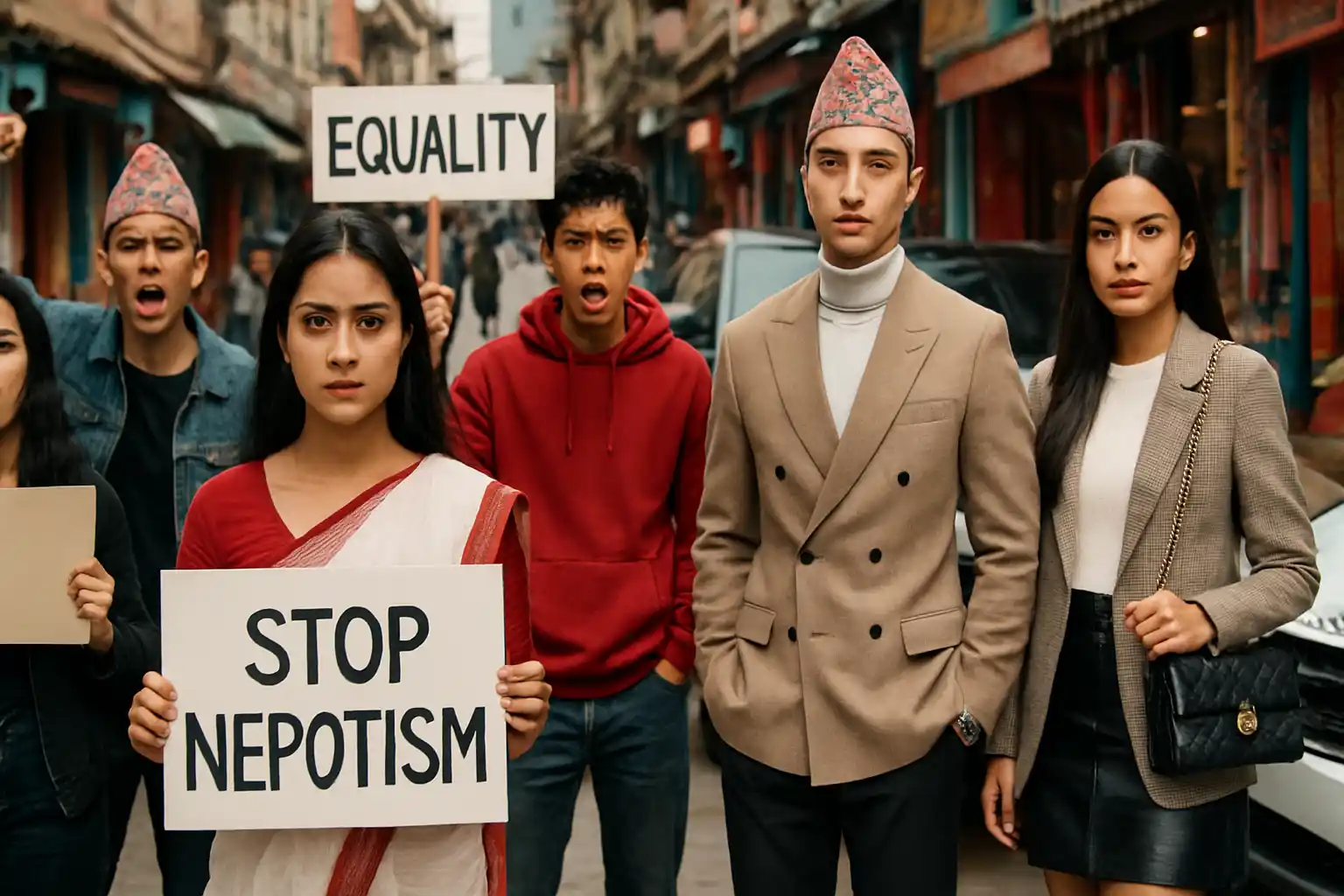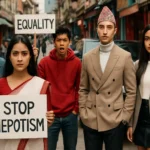Nepo Kids in Nepal spark outrage over inequality. Discover the shocking truth, youth struggles, and smart solutions to avoid failures and build fairness.
Nepo Kids in Nepal talks about how many people, especially young Nepalis, are distraught with the children of powerful politicians. These kids, known as Nepo Kids, appear to lead affluent and extravagant lives due to their family connections. Meanwhile, many regular people in Nepal have a hard time with money, jobs, and daily life. This difference has made a lot of young people angry and inspired protests.
Introduction
The blog explains what Nepo Kids means. It is a word from nepotism, which means giving special advantages to family members, even if they don’t earn it themselves. In Nepal, the children of important politicians are being seen on social media enjoying expensive clothes, luxury cars, and fancy vacations, while many ordinary young people struggle to find work and live simply.
The Main Ideas
- Many Nepali young people made videos and posts showing how Nepo Kids live rich lives. For example, they show expensive bags, foreign holidays, and fancy cars.
- At the same time, many other Nepalis work very hard just to earn small wages or even move abroad for jobs.
- This situation made people very upset because it shows how some families use their power to get more money and privileges, while most people face poverty.
- The protests started because the government banned many social media apps, but they became bigger as young people expressed their frustration about corruption and unfairness.
- Some popular hashtags on social media, like #NepoKids and #PoliticiansNepoBabyNepal, helped spread the movement.
- While many support the protests, some people warn that blaming children for their parents’ actions can be unfair and might cause harm to them.
What Does This Mean?

This story is important because it teaches us that it is not nice when a few people get everything just because of who their family is. Everyone deserves a fair chance to succeed by working hard. When people feel unfairness, they want to speak up and make changes. Young people in Nepal are showing that they want a better future where fairness matters.
What Does Nepo Kids Mean? Understanding the Term and Its Origins
Nepo Kid is a term that comes from the word nepotism, which means giving special privileges to family members, especially in jobs or opportunities, even if they are not the most qualified. Originally popular in Hollywood for the children of celebrities, the phrase has now been widely used in Nepal to describe the children of powerful politicians and officials. These kids are seen enjoying rich and fancy lifestyles, which many believe come from their family’s influence rather than their own hard work. The term reflects concerns about fairness and privilege in Nepal’s society, where many people struggle to find jobs and earn a living. TRT Global Word
History and Rise of the Nepo Kids Trend in Nepal
The Nepo Kid trend in Nepal gained momentum in 2025 during a period of widespread frustration among young people. Social media platforms like TikTok and Reddit started showing videos and images of politicians’ children flaunting luxury goods like designer bags, expensive cars, and foreign vacations. This attracted public attention as ordinary Nepalis face difficult economic conditions. The term became a symbol of wealth inequality and corruption, fueled by growing youth unemployment and rising living costs. The trend quickly turned into a movement, with young Nepalis using the hashtag #NepoKids to question privilege and demand accountability, Economic Times.
How Nepo Kids Are Portrayed on Social Media and Public Reaction

On social media, Nepo Kids are often shown wearing expensive clothes, driving luxury cars, and traveling abroad, images that contrast sharply with the everyday life of many young Nepalis. Videos comparing these lavish lifestyles with ordinary hardships like joblessness and poverty went viral, stirring anger and frustration. This led to widespread protests, especially among Gen Z youth, who see the Nepo Kid symbols of a broken system that favors families of political elites. Public reaction includes both support for the movement demanding change and criticism warning against unfairly targeting children for their parents’ actions.
The Role of Nepotism in Creating Nepo Kids: An Overview
Nepotism, or favoritism toward family members, is at the core of the Nepo Kid phenomenon. Powerful politicians and bureaucrats in Nepal often use their positions and influence to offer special opportunities, wealth, or status to their children. This creates a cycle where these children inherit privilege without necessarily earning it. Nepotism undermines meritocracy, causes social resentment, and contributes to growing inequality. The Nepo Kids symbolize this system where success depends more on family ties than on individual talent or effort.
Impact of Nepo Kids on Nepal’s Youth and Society
The rise of Nepo Kids has had a profound impact on Nepal’s youth, most of whom face unemployment and economic challenges. Many young people feel left out of opportunities that seem reserved for a privileged few. This fuels frustration, resentment, and anger, leading to protests and demands for social justice. The Nepo Kids issue has exposed deep divides in Nepalese society, highlighting problems like corruption, unfair wealth distribution, and a lack of transparency in politics. The movement is pushing for reforms to create a fairer Nepal where merit, not connections, defines success.
Comparing Nepo Kids with Political Families in Other Countries
Nepotism among political families is not unique to Nepal. Similar situations exist in countries including the Philippines, India, and the United States, where children of politicians often benefit from their parents’ power. What makes Nepal’s case stand out is the large-scale youth uprising tied closely to social media awareness and economic difficulties that many young Nepalis face. While the term “Nepo Kids” has Hollywood origins, referring to celebrity children, Nepal’s version focuses on political privilege and systemic corruption, making it a hot-button social and political issue.
Why Are Nepo Kids a Hot Topic in Nepal Protests?

Nepo Kid became central to Nepal’s 2025 protests because they represent broader frustrations with corruption and inequality. The protests originally started over a government ban on social media apps, but quickly expanded to include anger over elite privilege. Gen Z protesters highlighted the stark contrast between their struggles and the lavish lifestyles of politicians’ children, often seen flaunting wealth on TikTok. The Nepo Kids sparked outrage as many believed their families misused taxpayer money to fund their luxury lives. This made the issue a rallying point demanding transparency, fairness, and justice.
Social Media Campaigns and Hashtags Supporting the Nepo Kids Movement
Social media was the key platform where the Nepo Kids movement gained strength. Hashtags like #PoliticiansNepoBabyNepal, #NepoKids, and #NepoBabies effectively spread videos and images exposing the luxurious lifestyles of political heirs. These campaigns contrasted elite excess with the everyday hardships of ordinary Nepalis, amplifying calls for change. The online movement connected with youth all over the country, inspiring mass protests and bringing international attention to Nepal’s fight against nepotism and corruption.
Debates and Criticism Surrounding Nepo Kids and Their Families
While many support the Nepo Kid movement, some critics warn against unfairly blaming children for their parents’ actions. Concerns have been raised about cyberbullying and privacy invasion, since many Nepo Kids are targeted online with harsh criticism. There is also debate about whether the focus on individual families distracts from systemic solutions to corruption. Supporters argue that holding these families accountable is important for reform, while opponents caution that legal and social fairness must be preserved.
How Nepo Kids Influence Politics and Economy in Nepal
Nepo Kid influences politics and the economy by perpetuating cycles of power and privilege. Their families often hold key government posts or political influence, shaping policy and resource distribution. The concentration of wealth and opportunity within a few elite families limits competition and slows social progress. This affects Nepal’s economy by restricting access to jobs and resources for the wider population, contributing to frustration among youth and slowing development. The Nepo Kids symbolize this grip on power that many protesters want to break.
Ways Nepal Is Addressing Nepotism and Privilege Issues
Nepal’s government and civil society have begun acknowledging the challenges posed by nepotism. Efforts include more transparency in political appointments, anti-corruption drives, and youth engagement programs to provide equal opportunities. However, these reforms are still slow, and pressure from public protests remains vital to push for meaningful change. The current momentum created by the Nepo Kid movement is encouraging policymakers to listen more carefully to youth voices and demands for fairness.
How You Can Support Fairness and Equality Beyond the Nepo Kids Debate
Supporting fairness and equality means promoting meritocracy, transparency, and inclusion in all areas of society. This can start with educating young people about the importance of fairness and challenging privilege. Active participation in community initiatives, voting responsibly, and holding leaders accountable are ways to help. Sharing verified information and supporting anti-corruption movements can also make a difference. Everyone has a role in building a society where opportunities are earned and not inherited.
Smart Solutions to End Nepo Kids’ Privilege in Nepal
1. Ending Nepotism: Give Everyone a Fair Chance
Nepal needs to create more jobs and education opportunities based on talent, not family ties. This means hiring people for what they can do, not who they know, so young people get a fair shot.
2. Fighting Corruption: Make Politics Clear and Honest
The government should have strong rules to stop corruption and favoritism. Transparent processes and honest leaders help ensure power and money are fairly shared among all citizens.
3. Empowering Youth: Get Young People Involved in Change
Young Nepalis should be encouraged to join politics and decision-making. Their fresh ideas and energy can help create a society where success comes from hard work, not family status.
4. Use Social Media Wisely: Raise Your Voice Without Hurting Others
Social media helps expose unfairness, but it should be used to promote positive change without bullying or hurting innocent people. Responsible sharing and respectful discussions can bring awareness and solutions.
5. Support Skill Training: Help Everyone Build Their Future
Programs that teach useful skills and provide job training can give young people real chances to succeed. When more people have strong skills, they don’t need to rely on family connections to find good work.
Recommended External Resources on Nepo Kids
CNN:
Conclusion
The Nepo Kids phenomenon highlights a deep social divide in Nepal marked by inequality, privilege, and corruption. It has sparked a powerful youth movement demanding fairness, accountability, and systemic reform. While the issue centers on the children of politicians, the broader call is for a Nepal where merit, not family connections, shapes the future. Understanding the origins, impact, and ongoing debates around Nepo Kid helps us appreciate the challenges and the hopeful determination of Nepal’s younger generation pushing for change.
FAQs
Who are the Nepo Kids in Nepal?
Nepo Kids are the children of powerful politicians and government officials in Nepal. They are often seen living lavish lifestyles, which many believe come from their family’s political influence rather than personal merit.
Why is the Nepo Kids trend becoming popular on social media?
The trend gained popularity because videos and images showed a sharp contrast between the wealthy lifestyles of Nepo Kids and the struggles of ordinary Nepalis. Social media amplified youth frustration over inequality and corruption.
How do Nepo Kids affect Nepal’s political system?
Nepo Kid symbolizes nepotism, where family connections rather than merit guide access to power and resources. This concentration of privilege undermines fair competition and fosters corruption in politics.
What protests are related to Nepo Kids in Nepal?
The Nepo Kids became a central issue during the 2025 Gen Z protests in Nepal, which began over a social media ban but expanded to demand action against corruption and elite privilege symbolized by Nepo Kids.
Are Nepo Kids only about politicians’ children?
While Nepo Kids mainly refer to politicians’ children, the term can also apply to children of wealthy bureaucrats and influential figures who benefit from family power and privilege.
What is the public opinion on Nepo Kids in Nepal?
Many Nepalis, especially the youth, express anger and frustration toward Nepo Kids as symbols of inequality and corruption. However, there is also concern about privacy and fairness in targeting children for their parents’ actions.
How is Nepal trying to fight nepotism linked to Nepo Kids?
Nepal is taking steps to increase government transparency, cracking down on corruption, and engaging youth in political processes. Nonetheless, public pressure and protests remain essential for sustained reform.
Disclaimer
This blog shares my personal views and info only. It’s not expert advice. Please use the info at your own risk.
ALSO READ – Nepal Bans Facebook and Other Social Media List
- Banking Apps
- Best Deals
- Credit Cards
- Earning Apps
- Health Insurance
- Instant Loan Apps
- Jobs
- Life Insurance
- Trending Topic











